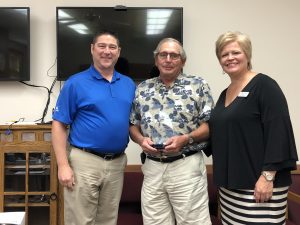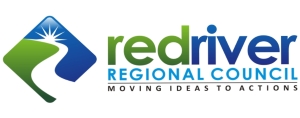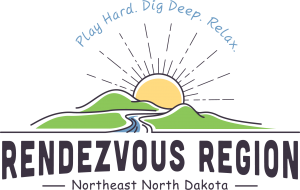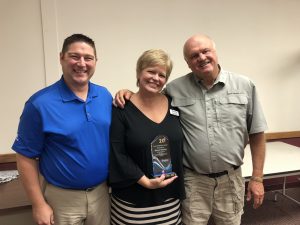September 6, 2019
RRRC Releases 5-Year Strategic Plan
With much appreciation to the Strategic Plan Committee comprised of 35 regional leaders, Board of Directors, staff and Praxis Strategy Group, the RRRC is releasing its 5-year regional economic development strategic plan. The plan is designed to engage community leaders in a regional planning process to build capacity and guide development efforts for the forthcoming period.
The RRRC completes and submits the Strategic Plan in accordance with the US Department of Commerce Economic Development Administration guidelines which also enables communities and entities within Region 4 to access EDA funding for infrastructure, planning, revolving loan funds, and development staff.
The RRRC's full strategic plan is available here: http://redriverrc.com/wp-content/uploads/2019/09/RRRC-CEDS-FINAL-8-28-19-Optimized.pdf
New program eligibility data released The pre-application deadline for Region IV’s (Grand Forks, Nelson, Pembina and Walsh counties) Community Development Block Grant is June 26, 2019. More than $200,000 is expected to be available to projects in the region. WHAT IS CDBG? The Community Development Block Grant (CDBG) was established by Congress in 1974 and is administered by the U.S. Department of Housing and Urban Development (HUD). The North Dakota Department of Commerce – Division of Community Services administers the CDBG program for the state with funding recommendations developed by the eight regional councils. The Red River Regional Council (RRRC) makes funding recommendations for Region IV. As defined by HUD, the primary purpose of CDBG is “the development of viable communities, by providing decent housing and suitable living environment and expanding economic opportunities, principally for persons of low and moderate income.” DEFINING LOW AND MODERATE INCOME Low and moderate income (LMI) households are those that are up to 80% of the median household income based on household size. Household income is derived from Census data and differentiates by household size. In April 2019, HUD published new LMI data for the CDBG program which includes significant changes in eligibility for communities in Region IV. Please see the LMI community stat chart link below. The new data has resulted in 15 additional LMI communities in Region IV; whereas only two are no longer classified as LMI. MEETING A NATIONAL OBJECTIVE In order to be eligible for CDBG funds, a project or activity must meet at least one of the national objectives: Activities benefiting low and moderate-income persons:
- The benefits are available to all the residents in a particular area, where at least 51% of the residents are LMI.
- Where the assistance is to a public improvement that provides benefits to all the residents of an area that is limited to paying special assessments levied against residential properties owned and occupied by LMI persons.
- Any cities or counties having 51% or more of households meeting these criteria meet the definition of an LMI community. Please review the accompanying 2010 vs 2015 LMI community stat chart for a complete list of Region IV communities and LMI percentages.
- In a community with 51% or more LMI residents, CDBG funds can be used for construction costs on public facilities projects. If the community is under 51% LMI, CDBG funds can only be used to pay the special assessments of the LMI provided the total LMI assessments do not exceed available CDBG funds.
- An activity which benefits a limited clientele, at least 51% of whom are LMI.
- Project directed to removal of material and architectural barriers (ADA accessibility) in publicly owned and privately owned non-residential buildings and facilities.
- An activity carried out for the primary purpose of providing or improving permanent residential structures which will be occupied by LMI households.
- Create permanent jobs were at least 51% of which involve the employment of LMI persons.
- For job retention, the city or county must document the job would be lost without CDBG assistance and the job is known to be held by a LMI person; and/or the job can reasonably be expected to turn over within the following 2 years and will be filled by, or steps will be taken to ensure it is available to, an LMI person.
- Resulting area must remain perpetual greenspace or if new construction the end result must meet a national objective.
- Public infrastructure projects such as: lagoon improvements, sanitary sewer lift station, reconstruction of street lights, replacement of fire hydrants, street paving, fire hall construction, etc.
- Housing rehabilitation, conversion and construction – single and multi-family.
- Removal of architectural barriers (handicap accessibility). Any community, regardless of LMI, can use CDBG for these types of projects.
- Economic development: Part of the ND Community Development Loan Fund (CDLF), which targets both primary and retail sector businesses and job creation/retention for LMI. Used for business gap financing, business purchase, equipment, working capital and infrastructure. Examples of projects funded in our region include: extension of water and sewer infrastructure to support the construction of a new business; business purchase; heating, cooling and roofing updates on a building.
- A city or county must be the applicant. The city or county must adopt a Resolution of Sponsorship which must be included with the pre-application (due June 26, 2019).
- If the estimated project cost is $25,000 or more, the applicant must procure a licensed architect or engineer, including drawings or plans and preliminary architect/engineer report.
- The applicant share is the engineering/architect fees and grant administration which is 10% of CDBG award for public facilities projects and economic development projects; 15% for housing rehabilitation and public facilities special assessment projects.
- An environmental review must be conducted for all projects prior to submission of the grant to the state.
- All applicants must conduct at least one public hearing and community needs assessment prior to submitting a grant to the state. At least one public notice regarding the intention to apply for CDBG will need to be published in the municipality’s official newspaper.
- CDBG requires contractors working on a project to pay applicable Davis Bacon wage rates which can increase the overall cost of a project.
Walsh and Pembina counties are currently seeking cities interested in funding assistance for community betterment projects. Both Pembina and Walsh counties are accepting applications for projects as part of their Self-Help Programs. There are many ways communities can use these county funds for betterment projects. Examples of projects cities have used the funds toward include: maintenance and mowing at a city park; baseball diamond repairs; sidewalk and street repairs; Senior Center programs; and building repair. The main objective is to promote development within communities of Pembina and Walsh counties. The Red River Regional Council manages the program on behalf of the counties. There are four program criteria:
- Requests cannot exceed one-half of the total project cost, nor can the request exceed $1,500.
- The county funds must be matched 1:1. Funds will be released on a reimbursement basis with supporting documentation.
- A copy of a resolution or minutes of the meeting when the applicant authorized the project must be included with the application. The city must include in its minutes that it plans to apply for self-help funds for a specific project.
- Any change in scope of the awarded project or if a City would like to use funds for a different project than awarded, the change must first be approved by the County.
Commissioners in Pembina and Walsh counties recently awarded funds to cities for community betterment projects as part of the ½ Mill “Self-Help” Program. The self-help program is administered by the Red River Regional Council (RRRC) on behalf of the counties. The main objective is to promote development within communities of Pembina and Walsh counties. There are three program criteria:
- ½ Mill requests cannot exceed one-half of the total project cost, nor can the request exceed $1,500.
- The county funds must be matched 1:1. Funds will be released on a reimbursement basis with supporting documentation.
- A copy of a resolution or minutes of the meeting when the applicant authorized the project must be included with the application. The city must include in its minutes that it plans to apply for self-help funds for a specific project.
- Bathgate: Street maintenance, mowing and snow removal
- Cavalier: Pocket Park, Main Street lighting, city beautification
- Crystal: Sidewalk replacement project
- Drayton: Sidewalk replacement project
- Mountain: Sidewalk replacement project
- Pembina: City park improvements
- Thomas: Sidewalk replacement project
- Adams: Costs to relocate fill material
- Edinburg: Repair pavement from frost boils
- Fairdale: Maintenance and mowing of the city park
- Fordville: Costs associated with city skating rink
- Forest River: Gravel for street repair
- Grafton: Costs to purchase statue for Veteran’s Memorial Park at Heritage Village
- Hoople: Costs to drill new city well
- Lankin: Street improvement equipment lease and maintenance
- Minto: Tree trimming and cleanup
- Park River: Replace doors at city hall
- Pisek: Street sign replacement project
August 27, 2018
Seeking Nominations to Recognize Community Leadership
The impactful people, projects and ideas that make this region strong will again be celebrated at the fourth annual Ideas to Actions Summit, an event hosted by the Red River Regional Council (RRRC). The event is set for November 15, 2018 at the Minto Community Center. “We are excited to continue with the Ideas to Actions Summit take a bit of time to recognize people, ideas and projects moving communities forward throughout the region,” said Dawn Keeley, Executive Director of the RRRC. The RRRC is seeking nominations for the 2018 North Star, Catalyst and Collaboration Awards. The North Star Award will go to an idea that illuminates opportunities or creates a guiding light for progress within a community; the Catalyst Award will recognize an individual who acts as a kickstarter for an idea or a project; and the Collaboration Award will recognize a successful project that involve teamwork and create a notable impact. The purpose of the Ideas to Actions Summit is to create excitement about the potential of the region’s communities, and to recognize the excellent work of the region’s leaders and communities. The agenda includes a networking social, a keynote presentation, and the awards presentation. All events will be held at the Minto Community Center and are free and open to the public. More information about the award criteria and how to complete a nomination form can be accessed several ways - at the RRRC’s website at www.redriverrc.com; the RRRC’s Facebook page; by calling the RRRC office at 701.352.3550 to request a form be mailed to you; or by emailing cheryl@redriverrc.com . The deadline for nominations is October 1, 2018. All nominees will be recognized at the Summit. The RRRC is one of eight regional planning councils in North Dakota established in 1973 to enhance the ability of local governments to jointly plan, address issues, and seize opportunities that transcend individual boundaries. The RRRC serves Region IV which includes Grand Forks, Nelson, Pembina, and Walsh Counties. More information can be found at www.redriverrc.com. Ideas to Actions Summit Awards Nomination Form 2018 - FILLABLE WORD
CDBG Awards The Red River Regional Council Board of Directors allocated its $202,711 in 2018 Community Development Block Grant (CDBG) funds to three projects in Region IV at its meeting August 17, 2018. The projects include:
- $57,500 to the City of Minto for a housing rehabilitation project. The project will assist qualifying low and moderate-income homeowners with health and safety issues in their homes at no cost to the homeowner. Common repairs including roofing, windows, doors, plumbing, heating and electrical, and other safety and accessibility items. It is anticipated up to 12 homes will be rehabilitated and the work will begin in 2019.
- $99,500 to the City of Walhalla on behalf of the Walla Theater project. The city will be the applicant for this grant which will address accessibility in the theater. The CDBG funds will be used to construct two ADA accessible restrooms, add ADA compliant doors and automatic openers at the entrances, and construct the ramp and stage at the front of the theater. It is the goal of the Gorge Arts and Heritage Council, which has been working on this project for 10 years, to give the area a community center and gathering space. The theater will be utilized by the school and public and will be able to host talent shows, youth rallies, senior citizen entertainment, high school plays, holiday programs, recitals and of course, movies.
- $45,711 to the City of Grafton on behalf of the Tri-Valley Opportunity Council’s energy efficiency project at the facility in Grafton. Tri-Valley Opportunity Council supports a Migrant Head Start program at the facility in Grafton. The program serves children of migrant families from age 6 weeks to 5 years old. There are potentially 109 children enrolled for the 2018 season which is May to November. The project will consist of replacing 24 wood windows and heat exchanger for the building. New controls will be installed to more efficiently control the mechanical systems in the building.

Outgoing board member Mayor Ken Briese, Cavalier, recognized for his service by Chris Lipsh, President, and Dawn Keeley, Executive Director
The pre-application deadline for Region IV's (Grand Forks, Nelson, Pembina and Walsh counties) Community Development Block Grant is June 28, 2018. Anyone interested in applying for a potential project is strongly advised to contact CDBG Program Manager Stacie Sevigny as soon as possible. The Red River Regional Council will have $202,711 available for distribution to projects in Region IV in 2018. WHAT IS CDBG? The Community Development Block Grant (CDBG) was established by Congress in 1974 and is administered by the U.S. Department of Housing and Urban Development (HUD). The North Dakota Department of Commerce – Division of Community Services administers the CDBG program for the state with funding recommendations developed by the eight regional councils. The Red River Regional Council (RRRC) makes recommendations for Region IV, which includes Grand Forks, Nelson, Pembina and Walsh counties. As defined by HUD, the primary purpose of CDBG is “the development of viable communities, by providing decent housing and suitable living environment and expanding economic opportunities, principally for persons of low and moderate income.” DEFINING LOW & MODERATE INCOME Low and moderate income (LMI) households are those that are up to 80% of the median household income based on household size. Data is derived from the 2010 U.S. Census and differentiates by household size and is defined as all persons living in a single household. Income of anyone age 18 or older is included in the total. To see what the current income limits are when defining LMI households, please review this chart: income limits. MEETING A NATIONAL OBJECTIVE In order to be eligible for CDBG funds, a project or activity must meet at least one of the national objectives:
- Activities benefiting low and moderate-income persons:
- The benefits are available to all the residents in a particular area, where at least 51% of the residents are LMI.
- Where the assistance is to a public improvement that provides benefits to all the residents of an area that is limited to paying special assessments levied against residential properties owned and occupied by LMI persons.
- Any cities or counties having 51% or more of households meeting these criteria meet the definition of an LMI community. Please review the LMI stat chart for a complete list of Region IV communities and LMI percentages.
- In a community with 51% or more LMI residents, CDBG funds can be used for construction costs on public facilities projects. If the community is under 51% LMI, CDBG funds can only be used to pay the special assessments of the LMI provided the total LMI assessments do not exceed available CDBG funds.
- An activity which benefits a limited clientele, at least 51% of whom are LMI.
- Project directed to removal of material and architectural barriers (ADA accessibility) in publicly owned and privately owned non-residential buildings and facilities.
- An activity carried out for the primary purpose of providing or improving permanent residential structures which will be occupied by LMI households.
- Create permanent jobs were at least 51% of which involve the employment of LMI persons.
- For job retention, the city or county must document the job would be lost without CDBG assistance and the job is known to be held by a LMI person; and/or the job can reasonably be expected to turn over within the following 2 years and will be filled by, or steps will be taken to ensure it is available to, an LMI person.
- Resulting area must remain perpetual greenspace or if new construction the end result must meet a national objective.
- Public infrastructure projects including: lagoon improvements, sanitary sewer lift station, reconstruction of street lights, replacement of fire hydrants, citywide street paving, etc.
- Housing rehabilitation, conversion, construction
- Removal of architectural barriers (handicap accessibility)
- Economic development: Part of the North Dakota Community Development Loan Fund (CDLF), which targets both primary and retail sector businesses and job creation/retention for LMI. Used for new business gap financing, business purchase, equipment, working capital and infrastructure. Recent economic development projects funded in our region include: extension of water and sewer infrastructure to support the construction of a new business; and business purchase as well as heating, cooling and roofing updates in the building.
- A city or county must be the applicant. The city or county must adopt a Resolution of Sponsorship, which must be included with the pre-application.
- If the estimated project cost is $25,000 or more, the applicant must procure a licensed architect or engineer, including drawings or plans and preliminary engineering/architectural report. The RRRC can assist the applicant with bidding, etc., but the expertise of an architect/engineer is extremely helpful, especially when drafting bid specifications.
- The applicant share is the engineering/architect fees and grant administration which is 10% of CDBG award for public facilities and economic development projects; 15% for housing rehabilitation and public facility special assessment projects.
- An environmental review must be conducted for all projects prior to submission of the grant to the state. The process can take up to 60 days if the project is not in the floodplain. The review for projects in the floodplain can take 90 days or longer.
- All applicants must conduct at least one public hearing and community needs assessment prior to submitting a grant to the state. At least one public notice regarding the intention to apply for CDBG will need to be published in the municipality’s official newspaper.
- CDBG requires contractors working on a project to pay Davis Bacon wage rates which can increase the overall cost of a project. Contractors must pay employees weekly and submit weekly payroll reports to verify wage rate compliance.
- If a contractor is awarded more than $100,000 on a project or the applicant receives more than $200,000, Section 3 requirements will apply. Section 3 requires specific steps be taken so that low and very low-income residents and Section 3 business concerns have an opportunity to benefit from the project.
- Applicants that have not completed a Section 504 Self Evaluation Transition Plan (an evaluation of city/county owned facilities for accessibility) will be required to complete one prior to completion of the project. Communities that have a transition plan will be required to make any necessary updates. The plan requires local governments to evaluate their programs, activities, buildings and services to ensure they are accessible to individuals with disabilities.
April 24, 2018
Walsh and Pembina Counties Seeking Applications for Funds for Community Betterment Projects
Walsh and Pembina counties are currently seeking cities interested in funding assistance for community betterment projects. Both Pembina and Walsh counties are accepting applications for projects as part of their Self-Help Programs. There are many ways communities can use these county funds for betterment projects. Examples of projects cities used the funds toward include: maintenance and mowing at a city park; baseball diamond repairs; sidewalk and street repairs; Senior Center programs; and building repair. The main objective is to promote development within communities of Pembina and Walsh counties. The Red River Regional Council manages the program on behalf of the counties. There are four program criteria:
- Requests cannot exceed one-half of the total project cost, nor can the request exceed $1,500.
- The county funds must be matched 1:1. Funds will be released on a reimbursement basis with supporting documentation.
- A copy of a resolution or minutes of the meeting when the applicant authorized the project must be included with the application. The city must include in its minutes that it plans to apply for self-help funds for a specific project.
- Any change in scope of the awarded project or if a City would like to use funds for a different project than awarded, the change must first be approved by the County.
In partnership with the City of Minto and the Walsh County Job Development Authority, the Red River Regional Council (RRRC) is currently seeking interested homeowners for a potential housing rehabilitation project for owner-occupied homes within the city limits of Minto. Applications are being accepted until March 30, 2018 to meet grant funding deadlines. The program assists low income residents with health and safety issues in their homes at no cost to the homeowner. Common repairs include roofing, windows, doors, plumbing, heating, electrical, and other safety or accessibility items. Federal funding sources also require lead paint, floodplain, and historic preservation issues be addressed. When complete, all homes must meet Section 8 Housing Quality and Safety standards. The RRRC is currently seeking interested homeowners to apply for the potential project in Minto. Similar projects were recently completed in Cavalier and Grafton. The RRRC is currently working with the City of Park River on a housing rehabilitation project in that city. Determining the potential number of applicants will assist in developing a possible funding package for the potential project which will include several federal grant funding resources. If grant applications are successful, any potential applicants will need to provide updated income documentation at that time, likely in the summer or fall of 2018. The project would likely start fall of 2018 or early 2019. Eligiblity In order to be eligible for this program, homes must:
- Be located within the city limits of Minto
- Be single-family
- Be owner-occupied (no rentals)
- Mobile homes are not eligible
- Homeowners must not have outstanding debt/taxes with the City of Minto
- The cost to rehabilitate a home must be conducive to its true and full value
- A copy of 2017 property tax statement to prove ownership.
- A copy of the current homeowner’s insurance statement.
- A copy of 2017 income tax statement. Please provide 2016 income tax statement if 2017 is not yet available.
- The most recent two months of personal bank statements (personal and checking).
- A copy of 2018 social security benefits statement, if applicable.
- If employed, copies of pay stubs for the past three months.



